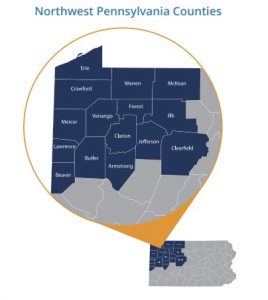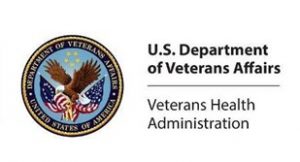 The Northwest Pennsylvania (NW PA) Veteran Suicide Prevention Program operates on a three-pronged approach involving healthcare providers, community organizations, and Veterans and their families in the 15 counties of NW PA. Because of this focus, we want to share this recent news release by VA about the outcomes experienced by Veterans and their families seeking assistance during an acute suicidal crisis. In 2023, VA’s new policy allowing eligible Veterans and certain former service members to go to any VA or non-VA health care facility for no-cost emergency health care during an acute suicidal crisis was implemented.
The Northwest Pennsylvania (NW PA) Veteran Suicide Prevention Program operates on a three-pronged approach involving healthcare providers, community organizations, and Veterans and their families in the 15 counties of NW PA. Because of this focus, we want to share this recent news release by VA about the outcomes experienced by Veterans and their families seeking assistance during an acute suicidal crisis. In 2023, VA’s new policy allowing eligible Veterans and certain former service members to go to any VA or non-VA health care facility for no-cost emergency health care during an acute suicidal crisis was implemented.
If you have any questions or would like to speak with someone about publicizing the NW PA Veteran Suicide Prevention Program in your community, please reach out to us.
Read time: 3 minutes
VA provides free emergency suicide prevention care to nearly 50,000 Veterans and former service members in first year of new policy
 In the first year of VA’s new policy allowing eligible Veterans and certain former service members in acute suicidal crisis to go to any VA or non-VA health care facility for no-cost emergency health care, 49,714 Veterans and former service members have used this benefit — providing them with lifesaving care and saving more than $64 million in health care costs.
In the first year of VA’s new policy allowing eligible Veterans and certain former service members in acute suicidal crisis to go to any VA or non-VA health care facility for no-cost emergency health care, 49,714 Veterans and former service members have used this benefit — providing them with lifesaving care and saving more than $64 million in health care costs.
This policy has helped prevent Veteran suicide by guaranteeing no cost, world-class care to eligible individuals in times of crisis — including emergency room care, inpatient or crisis residential care for up to 30 days, outpatient care for up to 90 days, and transportation costs. The policy has also increased access to no-cost emergent suicide care for up to 9 million Veterans, because eligible Veterans do not need to be enrolled in the VA system or go to a department facility to use this benefit.
Ending Veteran suicide is VA’s top clinical priority and a key part of President Biden’s Unity Agenda. Since 2021, VA has worked aggressively to expand support for Veterans in crisis, including launching the 988 (then press 1) to help Veterans connect more quickly with caring, qualified responders through the Veterans Crisis Line; partnering with community-based suicide prevention organizations to provide Veterans with on-the-ground support; expanding firearm suicide prevention efforts; and encouraging Veterans to reach out for help through a national Veteran suicide prevention awareness campaign. Moving forward, VA and the Biden-Harris Administration will continue to work urgently to end Veteran suicide through a public health approach that combines both community-based and clinically based strategies to save lives.
“There is nothing more important to VA than preventing Veteran suicide — and this expansion of no-cost care has likely saved thousands of lives this year,” said VA Secretary Denis McDonough. “We want all Veterans to know they can get the care they need, when they need it, no matter where they are.”
 Any Veteran – enrolled in VA or not – can go to a VA or non-VA emergency room for no cost emergent suicidal care under this policy. Additionally, this benefit covers certain individuals who do not meet the requirements to be considered a Veteran, including those who were released from active duty under conditions other than dishonorable. It also covers service members — including reservists and national guard members — who served at least 100 days on active duty under a combat exclusion or in support of a contingency operation either directly or by operating an unmanned aerial vehicle from another location. Veterans who experienced military sexual trauma are also covered.
Any Veteran – enrolled in VA or not – can go to a VA or non-VA emergency room for no cost emergent suicidal care under this policy. Additionally, this benefit covers certain individuals who do not meet the requirements to be considered a Veteran, including those who were released from active duty under conditions other than dishonorable. It also covers service members — including reservists and national guard members — who served at least 100 days on active duty under a combat exclusion or in support of a contingency operation either directly or by operating an unmanned aerial vehicle from another location. Veterans who experienced military sexual trauma are also covered.
This benefit was created by the Veterans Comprehensive Prevention, Access to Care, and Treatment (COMPACT) Act of 2020. Under this policy, eligible individuals receive:
- Emergent suicide care provided by, paid for, or reimbursed by VA.
- Expanded access and eligibility (Individuals do not need to be enrolled in the VA system to use this benefit).
- Assurance that they will not be responsible for costs associated with emergency suicide care, including emergency transportation.
- Referral for appropriate VA programs and benefits they may be eligible for following the period of emergent suicide care.
To use this benefit, any eligible individual who is experiencing an emergency suicidal crisis should go to the nearest ER as soon as possible — transportation costs are covered by VA — and tell the ER staff that they are covered by this policy. The ER staff or someone acting on the individual’s behalf should notify VA right away by calling 844-724-7842 (TTY: 711) or using VA’s Emergency Care Reporting (ECR) portal.
If an eligible individual receives a bill for community care after receiving emergency care during or after a suicidal crisis that they believe should be covered by VA, they should contact VA’s customer service center as soon as possible at 877-881-7618.
Looking to Get Involved?
 Whether you identify as a healthcare provider, community organization, or Veteran, there are several opportunities through the NW PA Veteran Suicide Prevention Program and PERU to connect to resources, participate in educational training, and promote harm reduction strategies. We are actively recruiting healthcare and community partners to work with us in meeting our goals and objectives. To learn more, visit the program website at theresilientveteran.org.
Whether you identify as a healthcare provider, community organization, or Veteran, there are several opportunities through the NW PA Veteran Suicide Prevention Program and PERU to connect to resources, participate in educational training, and promote harm reduction strategies. We are actively recruiting healthcare and community partners to work with us in meeting our goals and objectives. To learn more, visit the program website at theresilientveteran.org.
Need Help? Know Someone Who Does? Contact the National Suicide Prevention Lifeline at 988 or use the online Lifeline Crisis Chat. Both are free and confidential. You’ll be connected to a skilled, trained counselor in your area.

